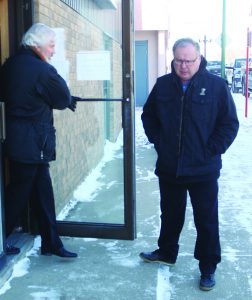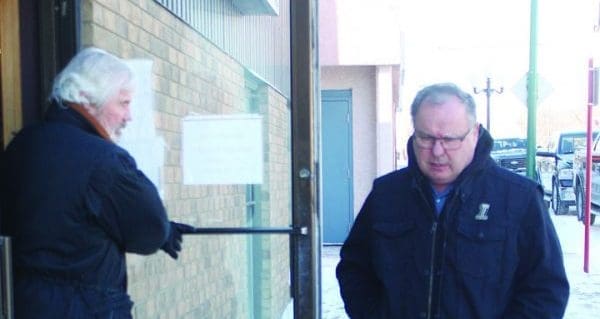Kenneth Brown
of The Clarion
Former Kindersley MLA Bill Boyd has pleaded guilty to charges under provincial wildlife and environmental acts, and has signed orders to remedy the damages.
Boyd was at provincial court in Kindersley on Feb. 6 before Judge Robert Jackson. Robert Ard, Boyd’s defence lawyer, entered guilty pleas to two charges but the judge chose to reserve his decision on part of the sentence.
The charges against Boyd included three violations under the Environmental Management and Protection Act and one charge under the Wildlife Habitat Protection Act. The four charges are related to the altering of shoreline, wildlife habitat and ecological land along a stretch of the South Saskatchewan River.
Boyd pleaded guilty to his charge under the Wildlife Habitat Protection Act and to one of his three charges under the Environmental Management and Protection Act. The other two charges will be stayed after Boyd is sentenced.
[emember_protected for=”2″ custom_msg=’For more on this story, please see the Feb. 14 print edition of The Clarion.’]

Former MLA Bill Boyd (right) leaves the Kindersley Masonic Hall followed by his lawyer, Robert Ard, after his environmental matters were heard on Feb. 6 in provincial court. Boyd has pleaded guilty to two charges.
Crown prosecutor Matthew Miazga told the court that the Crown and defence were in full agreement on the orders to remedy by completing additional land reclamation under the supervision of an environmental expert, but there was a “substantial disagreement” with respect to one of the fines.
“Obviously, the Crown’s seeking quite a substantial fine,” Miazga said, recognizing that the defence does not believe the amount of the fine is appropriate in the case and there is not much case law for the lawyers to share.
The prosecutor said the defence has agreed to a fine of $5,000 for the Wildlife Habitat Protection Act violation, but the Crown is seeking a fine in the range of $25,000 to $30,000 for the Environmental Management and Protection Act violation. Boyd, whose first attempt at reclamation was unsatisfactory, has signed the orders to remedy the damages.
Jackson, after the facts had been heard and the lawyers had made their submissions, chose to reserve his decision until a court date on April 17 in Kindersley. He noted that Boyd does not have to attend because the charges are not criminal.
Miazga said the incident involves an irrigation project on land owned by a numbered Saskatchewan limited company that is owned by Boyd’s son, but the former poitician has taken sole responsibility for the incident. The land, a quarter section near the river, is bordered by Crown land.
Court heard that Boyd was planning to install an irrigation pivot on the quarter section, but a portion of the land was not suitable for an irrigation pivot. Therefore, a decision was made to anchor the pivot at a place that was not the geographical centre of the quarter section. Ard said an irrigation company assured Boyd the pivot would fit on the quarter section because they would use a shorter pivot arm.
In the process of breaking the land to prepare it for a crop, a small area of ecologically-protected Crown land was broken. A GPS system was used in the process to break the land, but the system did not work properly and the work encroached on the Crown land.
There were concerns with the permits Boyd needed to proceed with work to access water from the river for the irrigation system. Miazga said a portion of the riverbank was altered when Boyd’s excavation equipment started to work at the shoreline. The project included a trench into the riverbed causing sediment to be washed downstream.
Court heard that Boyd did not do the work, himself, but he gave the order to an employee to do the work. Miazga, who told the court Boyd operates a seed farm, said the accused did not obtain the necessary permits and he had not applied for certain permits.
The prosecutor presented case law to support his submission for the fine, but told Jackson the case is different than others before it. He noted that the culpability of the case is the reason the Crown has asked for a large fine.
Miazga said Boyd was still an elected official at the time of the incident and he proceeded with the work even though ministry of agriculture officials told him he could not proceed in June. He said elected officials should set an example for others, so the Crown is seeking a more serious penalty.
Ard argued that his client did not know he was altering Crown land because the property line was hard to locate, and GPS used when breaking the land was inaccurate. As for culpability, he said it is unfair to suggest, even as MLA, that Boyd should know every law. Jackson admitted he does not often hear cases that involve environmental or habitat protection, so it was why he wanted time to consider his decision.
[/emember_protected]

